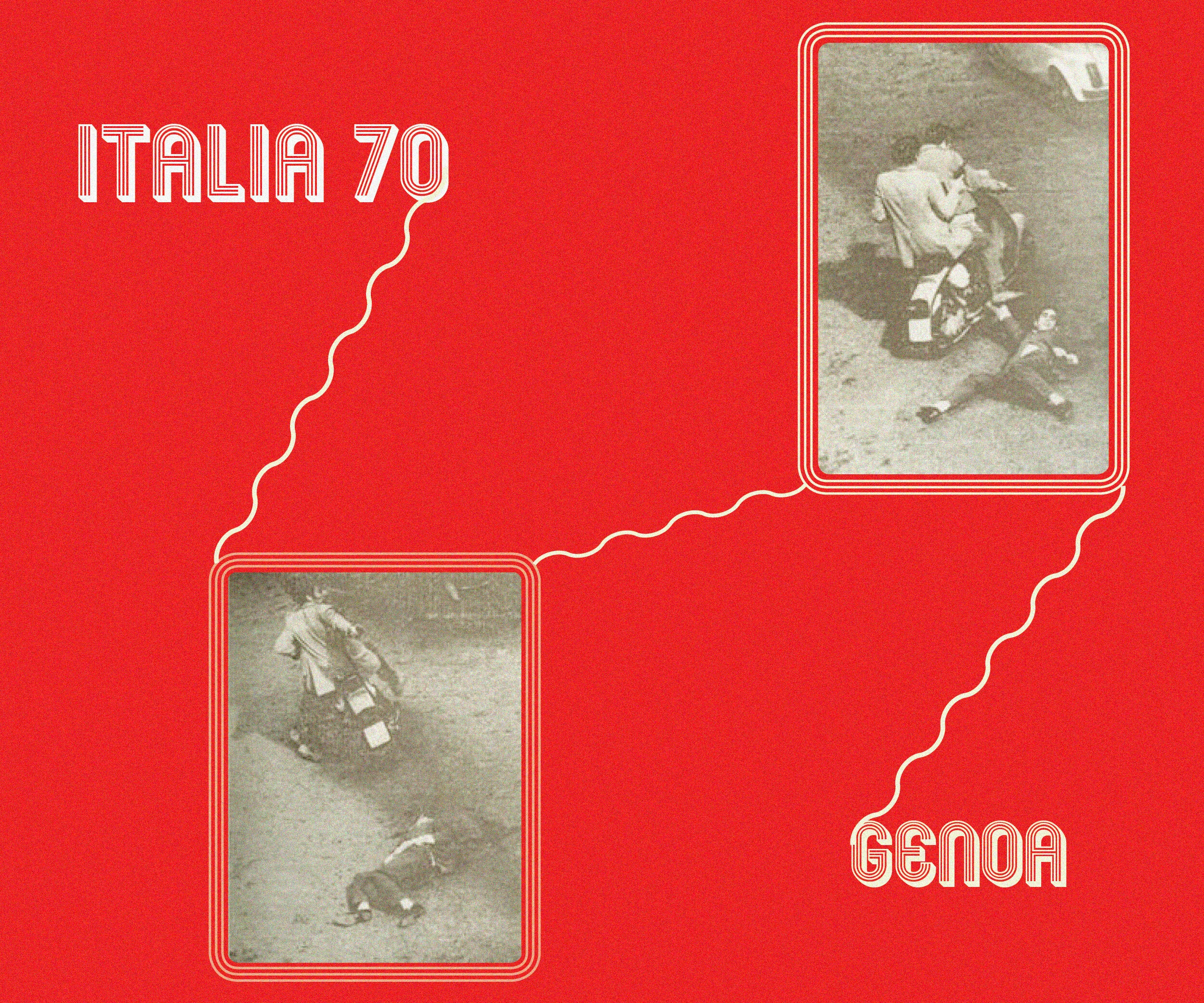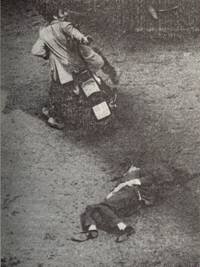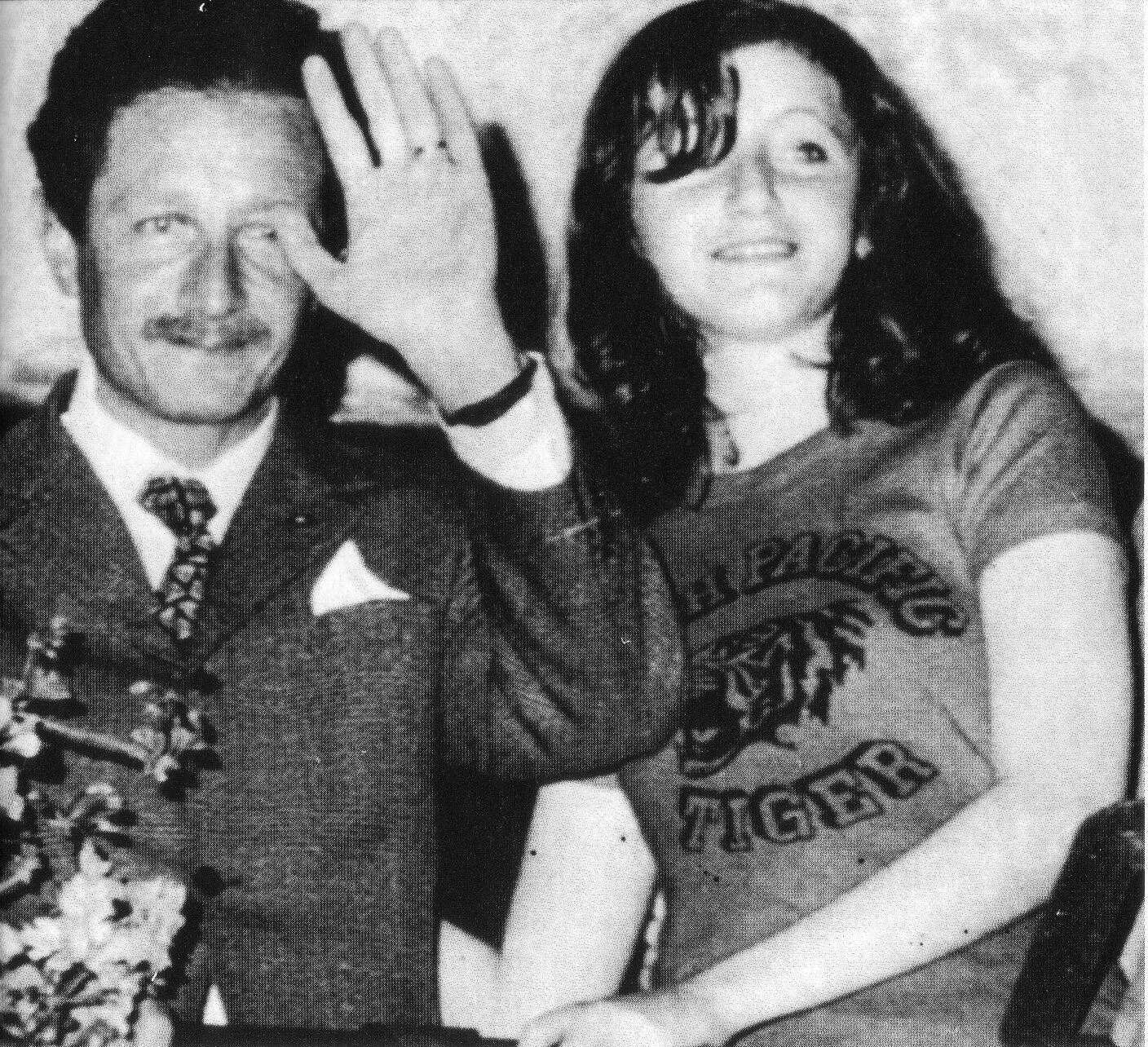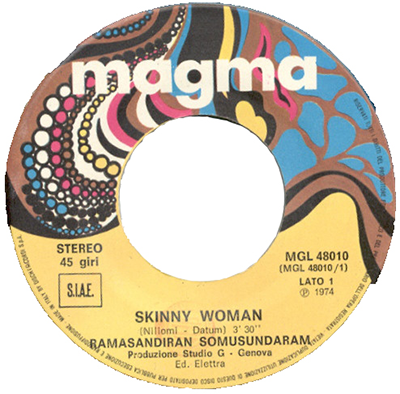Italia 70 - The Sound of Political Dissent / Genoa - Of Funk, Murders, and Lambrettas
Italia 70 is a series of stories exploring the music that soundtracked the Years of Lead, the turbulent and overtly politicised times that left an indelible mark in Italian history between 1969 and the late 1980s. In the first installment, Lorenzo Cibrario leads us through the maze-like alleys of Genoa among Lambretta-riding far-left terrorists and a mysterious Pakistani funk musician.
A prog flute plays velocissimo over rapid percussion, while a tambourine keeps the time frantically. A hungry bass line is running ferociously, and a chorus is chanting something shamanic and unintelligible. The music thumps lysergic between the alleys of a North Italian city, following the journey of a turquoise Lambretta. The scooter is rocking out through the lanes of this industrial city, a winding labyrinth of prostitutes, Jewish jewelries, pushermen and thorny cafes. It’s the end of March 1971 and it is still cold. Humidity rises from the dirty manholes, moistening the cobblestones of Via Bernardo Castello, in the centre of Genoa. The Lambretta is registered GE112187 and is winding like a snake among the dirty walls of the Renaissance buildings of the city centre. Slogans like ‘PROLETARIAN UNIONS’ or ‘OCCUPIED UNIVERSITY’ are written all over the walls. The disputes of May ‘68 are still leaving their marks on Europe and Genoa, with student associations rioting and squatting universities.
Two men, wearing leather shoes, brown corduroy trousers and broad collar suede jackets, are riding the turquoise Lambretta.They are chased by the police as they have just killed and robbed a man, Alessandro Floris, a security guard at the Istituto Autonomo delle Case Popolari (a company superseding council housing) who had left his office with a suitcase full of money. He has just been murdered with the complicity of an inside-man who works at that very same firm. One of the killers is called Mario Rossi and, together with his partner in crime, he is a member of a gang named XXII Ottobre (October 22nd). Their murder is considered another piece of the complex puzzle that is Italian political terrorism, which had started in 1969, with the bomb attack in Milanese square Piazza Fontana. Mario Rossi, such an anonymous name for such an important act in the history of Italy. Ironically, he was a taxidermist for a living. Over the following years, for the whole decade and more, there will be many other violent terrorist attacks in Italy, defying dark, Machiavellian years in the history of the Bel Paese.
The sequence capturing Giovanni Floris murder
Genoa, 1974. Smartly dressed in a blue Indian fabric suit, assistant district attorney Mario Sossi is on a bus. He is going back home after a long day of work at the Supreme Court of Genoa. It’s April the 18th and in the city the days are getting warmer and warmer. The sea reflects the pink light of the sunset, a sign of a new upcoming summer. A few bathhouses are getting ready for the new season, and gelato parlours in Boccadasse are open until 10 pm. In the air is a fragrant smell of Jasmine, like in the sunny corners of Mumbai. Bus number 42 links Piazza Fontane Marose to Albaro Alta - the quintessential place of the local haute bourgeoisie. The area is very far from the proletarian suburbs of the historical centre and far from the commercial area of Sampierdarena, and overlooks the whole city like a snooty Beverly Hills.
A few minutes later, a white Innocenti A112 and a forest green Fiat 128 are chasing bus 42. At the wheel are two members of far-left terrorist group Red Brigades, Alberto Franceschini and Mara Cagol. As soon as the attorney alights from the bus, they hit him on the head, and throw him in the Fiat 128. History will bring Mario Sossi to the town of Tortona, where he will survive the anger of the Red Brigades, albeit the very infamous motto ‘Sossi fascista, sei il primo della Lista’ (‘Sossi, you are a fascist, and you will be the first one to die’) written on the walls of the philosophy department of the University of Genoa, in Via Balbi 5. Together with this excruciating fact, many Italian cities during the whole 1970s face the horror of the Red Brigades, living violent times also known as ‘Years of Lead’, which left a permanent mark in the history of the country.
Above: Kidnapped judge Mario Sossi under Red Brigades detention, April 1974.
Right: Mario Sossi greets the photographers relieved upon his release.
In those same years, Genoa finds itself to be the composer of the perfect soundtrack of those dark times. Together with Storia di un Impiegato by singer-songwriter Fabrizio De André, it’s local label Magma (and its sister label Grog) to perfectly synthesize the zeitgeist of the time. Abrasive guitars, explosive horns and production meeting international standards overtook De André pleonastic socio-political activism, giving to future generations an interpretative key to those magmatic years.
During the first half of the 1970s, a man is walking those same alleys hiding the members of the XXII Ottobre gang. He sports long dark hair, a long beard, his skin is brown and his smile is bright. He comes from the East - the mysterious East, the one that smells of incense and amber. His name is Ramasandiram Somusundaram and nobody knows when he arrived in Genoa and from where. Could it be India? Maybe Pakistan? Or maybe was he from Cylon - run away from it just before it became Sri Lanka in 1972? The only thing people know about him is that he has a great skill: he plays percussion like a god. He is hanging around in bars, with a spliff in his long fingers, with a satin cream shirt and a jute bag, his eyes are deep and wise.
Ramasandiran Somusundaram, a mysterious, exotic man in Genoa.
“He’s such a god when he jams...”, “They say in India he was playing for the Gods...”, “It seems like he can induce a trance-like state to the listeners of his sitar...”, “Someone told me he was a guru...” The myths around his persona were thousands and thousands. We know very little about him, but that soon after his arrival, he starts playing in the most renown bands in Genoa, such as New Trolls’ Atomic System, Bambibanda & Melodie, and New Trolls. Most of them are fronted by the De Scalzi brothers, local prog heroes and owners of labels Magma and Grog. The collision of these two worlds, East and West, funk and prog, sitars and keyboards, gives life to a long playing named ‘Skinny Woman’ and several singles, all of excellent craft.
In 1973 Ramasandiran drops his first single named ‘Pasta e Fagioli’ (Pasta & Beans). A fast-played funky bass line chased by a crazy prog flute, wild percussion and an unintelligible chorus. Pure energy with an underlying orgiastic groove. The track is written and produced by Aldo De Scalzi and it is arguably one of the best funk tunes of its times, at least in Italy. A few months later, the collective release 7” ‘Skinny Woman’. Another funky ride with killer drums and catchy English lyrics. It sounds like a mix of Azimuth and soundtrack maestro Franco Micalizzi on acid.
The psychedelic label graphic for single ‘Skinny Woman’, Magma, 1974.
Two years later, in 1976, composer Micalizzi would write the soundtrack for Genova Mano Armata (Merciless Man), a film set in the same labyrinthic alleys where Ramasandiran Somusundaram is living and the Red Brigades member are planning their terrorist attacks.
However, there’s more to it. Ramasandiran’s success in local dingy clubs is formidable, to the point that in 1974 Magma releases the full-length Skinny Woman, 40 minutes of furious funk and pure fun. Besides the title track, the songs of the LP seem to have landed directly from the hyperspace of funk. ‘Everybody’ features a clavinet in the like of James Brown, Betty Davis or The Meters, ‘Electric Heart’ sounds like a newyorkese punk-funk tune, although released years ahead the rise of the genre. Psychedelic notes run through the record, conveying a sense of mystic transcendence and acid buzz. The record changes its direction with the masterpiece ‘Shanghai’, which could have been a Balearic hit some 15 years before the movement was even born in Ibiza. A languid guitar over mellow tablas and percussion drives the listener into the smoky realm of unconscious Indian dreams. ‘I Am Afraid of Losing You’ follows the path of funk music, getting its hands dirty with Afrobeat sounds. The other side of the record is an Indian-esque, hallucinogen trip into an imaginary soft-core film soundtrack, in the style of Francis Lai’s hottest scores.
Together with Aldo De Scalzi, the songs featuring on the album are written and produced by other members of New Trolls, hidden under funny monikers. Vittorio De Scalzi, Aldo’s brother and author of incredible Library Music records, is ‘Nillomi’, keyboard player Giorgio Usai is ‘Datum’, while drummer Gianni Belleno simply goes as ‘Belleno’. Two singles follow the album. First is 1975 ‘Funky Star’, then comes a soulful double-sider featuring covers of ‘You Keep Me Hanging On’ by The Supremes and ‘Hold On I’m Coming’ by Sam & Dave. At this point we lose every track of Ramasandiran Somusundaram.
Cover Design for Ramasandiran Somusundaram’s debut single ‘Pasta e Fagioli’, Magma, 1973.
Some say he’s still walking the alleys of Genoa like a spirit or a guru, others say he left Italy and moved back to India after the release of his last record.
We don’t know whether the percussionist and the other musicians were conscious they were writing the score of those dark times - an explosive sound, a noise from the guts. For sure, the visceral charge of the music perfectly fetches with the rampage of the Years of Lead.
During those times, the trend imposed a very politicised approach to music: every artist had to prove their militant statement with political lyrics. On the contrary, the Genoese score came from Pakistan, it was mostly instrumental and far from any political stance. In its different approach rests its power. Sweaty music coming from the guts of the proletariat, and not from the living rooms of the bourgeois in Albaro Alta.







